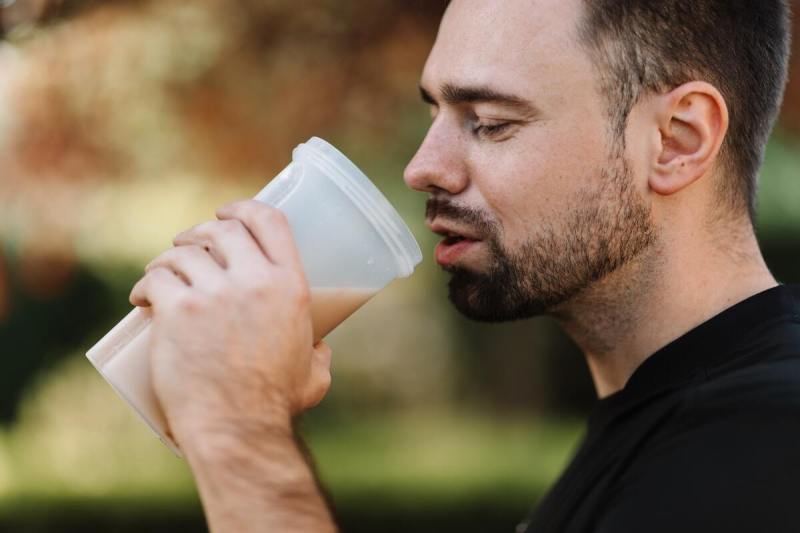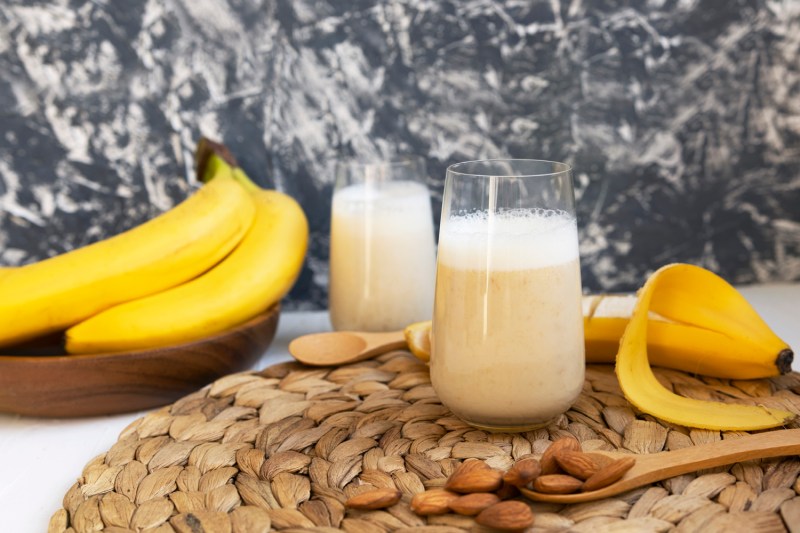What you eat is essential in dieting, but when you eat can also play a part in helping you achieve your fitness goals.
For instance, protein is an important macronutrient for building muscle. But do you know that drinking a protein shake before bed may have more specific benefits for building muscle and losing fat? Let’s look at some of the ways drinking a protein shake before bed directly fits into your health goals.
What are the benefits of having a protein shake before bed?

Enhanced muscle recovery
Protein consumed before sleep helps repair and rebuild muscle tissue, especially after intense workouts. It supplies amino acids that promote overnight muscle recovery and growth.
Increased muscle protein synthesis
A slow-digesting protein, like casein, ensures a steady release of amino acids throughout the night, which boosts muscle protein synthesis, the process that instigates muscle growth.
Improved metabolism
Protein digestion requires energy, which can slightly increase your metabolic rate overnight, aiding in fat loss and calorie burning while you rest.
Reduced late-night cravings
A protein shake can keep you full and curb unhealthy snacking or overeating late at night, supporting your overall dietary goals.
Better sleep quality
Protein, particularly when combined with magnesium or tryptophan-rich sources, may improve sleep quality by supporting relaxation and recovery.
Is it better to have whole foods or supplements?

Whole foods should be the foundation of your diet. These natural or minimally processed foods are nutrient-dense, providing your body with what it needs for daily functioning.
Supplements are great for convenience and targeting specific nutrient deficiencies. For example, if you’re struggling with your protein intake, a protein shake before or after exercise would help.
However, all your protein should not come from protein shakes. Instead, plant and animal protein sources should make up the bulk of your protein intake. The same goes for any other nutrient, including fiber, vitamins, minerals, and antioxidants. If you eat a balanced diet consisting of whole foods, you may not even need any supplements.
What are other good sources of protein?

Great plant protein options are lentils, chickpeas, black beans, tofu, edamame, quinoa, and nuts like almonds and walnuts. Seeds like chia seeds, flaxseeds, and sunflower seeds are also fine.
On the other hand, animal protein options include chicken breast, turkey, and fish like tuna, salmon, and cod. Eggs, beef, pork, and dairy products like Greek yogurt, cottage cheese, cheese, and milk also work as animal protein sources.
Apart from protein powder, processed protein sources include protein bars and canned fish like sardines and mackerel. These options make meeting your protein target easier but may not be the healthiest.
How much protein should you have before bed?

A 2017 study showed that consuming 30 to 40 grams of casein protein before bed could increase muscle protein synthesis. Casein protein particularly digests slowly. That makes it a great protein powder option to use before bed.
If your goal is to lose or manage weight, a similar range of around 20 to 30 grams can help curb hunger and prevent late-night snacking without overloading calories.
Making a protein shake for building muscle vs. losing weight

The difference between a protein shake for building muscle and one for losing weight lies in the ingredients and calorie content. You should remember that there doesn’t have to be a difference between muscle-building and weight-loss shakes.
Protein is essential for both weight loss and muscle building, and as long as you’re eating enough throughout the day, you will achieve either goal over time. Simply put, a muscle-building protein shake could double as a weight-loss shake, too.
Regardless, most people who want to gain muscle are in a calorie surplus. A calorie surplus is not essential for gaining muscle, but it helps because it provides your body with more energy to lift weights and become muscular. So, a protein shake for muscle building allows for more calories and would involve foods like milk, bananas, peanut butter, oats, yogurt, and honey.
A shake for weight loss, on the other hand, will likely not be as generous with the ingredients. Some almond milk, spinach or kale, frozen berries, and stevia to go with the protein powder are all you need for a low-calorie shake when trying to lose weight.
Frequently asked questions

Does protein at night burn fat?
Protein can help you stay in a calorie deficit by boosting your metabolism and reducing nighttime cravings. Its thermogenic properties help your body burn more calories during digestion, contributing to fat loss over time.
Is it okay to drink a protein shake without working out?
Protein supports overall health, including muscle repair, immunity, and hormone production. Drinking a shake without working out can be beneficial for maintaining muscle mass and body functioning.
What time is best to drink a protein shake?
The best time to drink a protein shake depends on your goals. For muscle recovery, post-workout or before bed is ideal. If you’re simply trying to meet your protein requirements, you can drink your shake whenever it’s convenient, pre or post-workout.




